Suspended chords create tension in music. Oftentimes they resolve to a more stable harmony such as a Major or minor chord. They can be a simple three note chord or part of an extended chord. It’s often denoted in chord symbols as “sus”.
A suspended chord on the piano is a three note chord in which the 3rd tone is omitted and replaced with either a perfect fourth tone or a Major second tone that is diatonic to the key. A suspended chord can be a suspended 4th or a suspended 2nd.
How to Create Suspended Chords
Even though suspended chords contain three notes, they’re not technically considered triads. They’re easily created by omitting the 3rd of a Major triad and adding the 4th or 2nd depending upon whether you wish to create a “sus4” or “sus2” chord.
Start with the Major Triad
Start with a Major triad. The Major triad consist of the first, third and fifth tones of a Major key of music.
C Major Triad
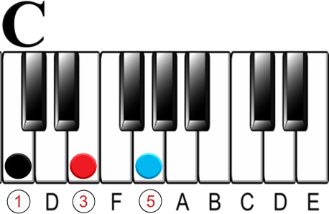
The Sus4 Suspended Chord
A Sus4 chord consists of the 1st, 4th and 5th tones of a Major key of music. To create the Sus4 chord, take a Major triad and raise the 3rd up a half step (one key).
Sus4 Chord
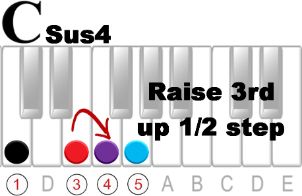
The Sus2 Suspended Chord
A Sus2 chord consists of the 1st, 2nd and 5th tones of a Major key of music. To create the Sus2 chord, take a Major triad and lower the 3rd down a whole step (two keys).
Sus2 Chord
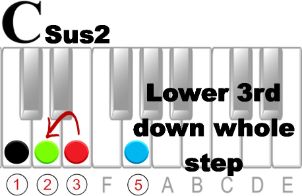
Suspended Chord Intervals
Chords are built upon intervals. Intervals are simply the distance between notes. They’re the fundamental elements of music that chords are built upon. The intervals of suspended chords are a combination of perfect 4ths and Major 2nd intervals.
The Sus4 chord intervals are a perfect 4th between the root and 4th and a Major 2nd between the 4th and 5th.
Sus4 chord Intervals
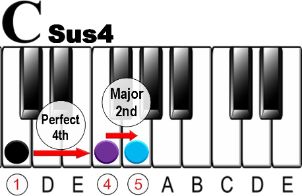
The Sus2 chord intervals are a Major 2nd between the root and 2nd and a perfect 4th between the 2nd and 5th.
Sus2 chord Intervals
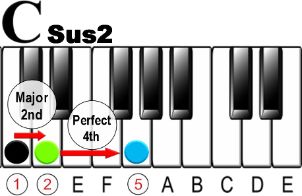
The Fastest Way to Learn Suspended Chords
Know your 12 Major chords before moving on to suspended chords. An effective strategy to learn suspended chords is to start from the Major chord. From there, you can transition to the Sus4 chord and then the Sus2 chord.
You can cycle from Major to Sus4, to Sus2.
Major to Sus4 to Sus2

This article, illustrates all 12 Major chords in visual order. It places the 12 Major chords into four groups of three for the purpose of putting them in visual order. Refer to it to learn all 12 Major chords in visual order to make it easier to transition to suspended chords. It’s quite easy to segue from Major to suspended chords in this order.
Creating Suspended Chords from The “Marshmallow” chords
(Major chords with all white keys)
C Major
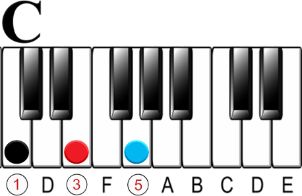
C Sus4
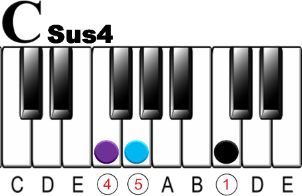
C Sus2
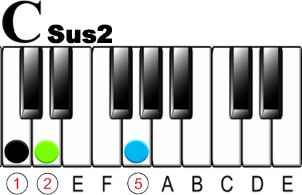
F Major
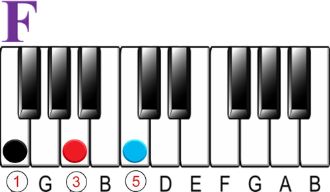
F Sus4
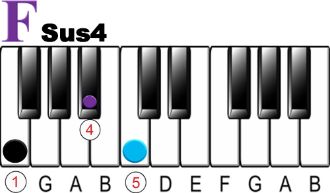
F Sus2

G Major
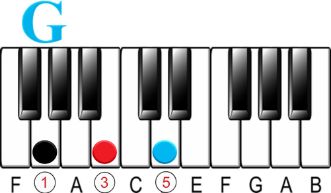
G Sus4
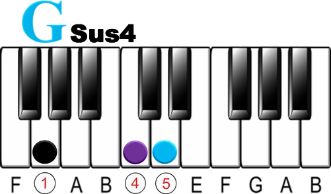
G Sus2
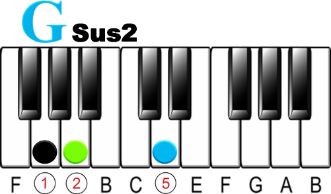
Creating Suspended Chords from The “Blackberry Jam Sandwich” Chords
Chords with white keys on the outside and black on the inside. You could also say that this group of chords is also shaped like a pyramid.
D Major
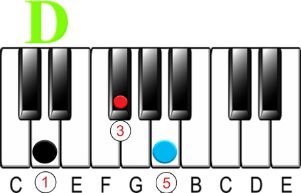
D Sus4
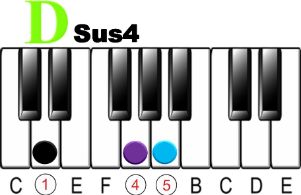
D Sus2
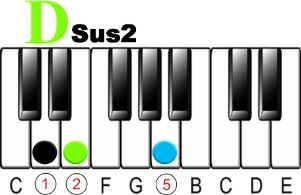
E Major
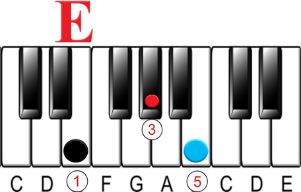
E Sus4
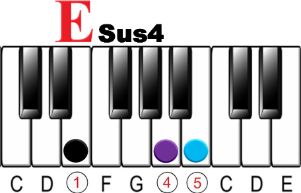
E Sus2
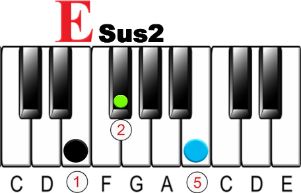
A Major
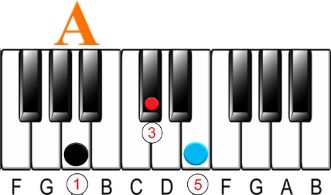
A Sus4
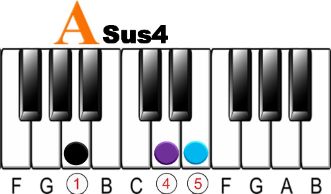
A Sus2
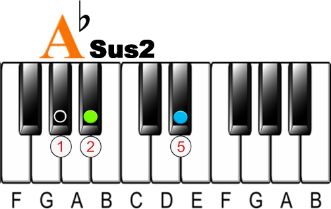
Creating Suspended Chords from The “Oreo Cookie” Chords
Chords with black keys on the outside and white keys on the inside.
D flat Major
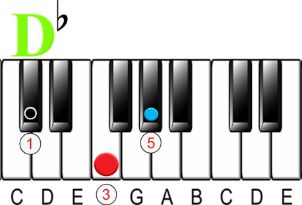
D flat Sus4
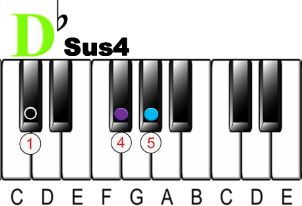
D flat Sus2
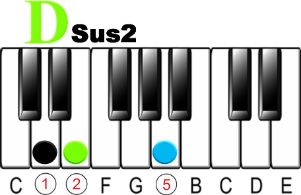
E flat Major
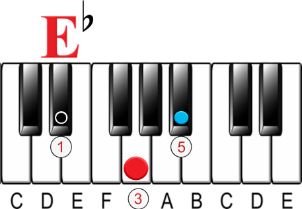
E flat Sus4
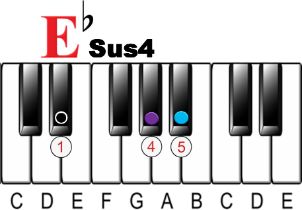
E flat Sus2
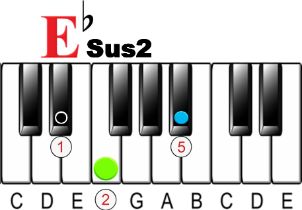
A flat Major
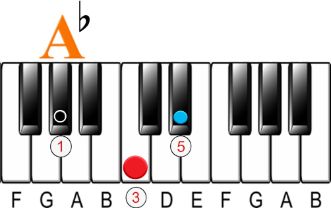
A flat Sus4
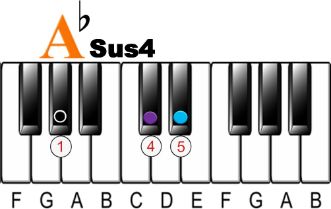
A flat Sus2
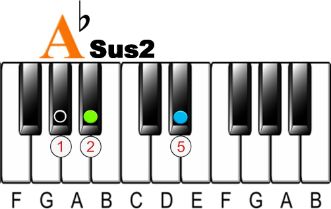
Creating Suspended Chords from The “Chocolate & Vanilla Chunk” Chords
Chords that have different combinations of black and white.
G flat Major
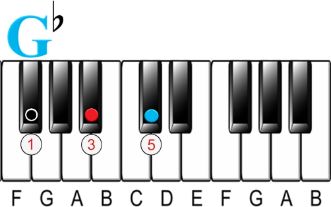
G flat Sus4
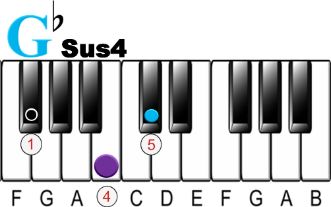
G flat Sus2

B flat Major
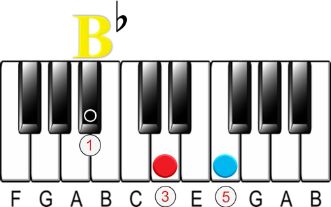
B flat Sus4
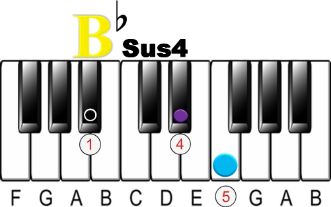
B flat Sus2
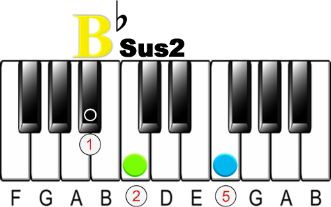
B Major
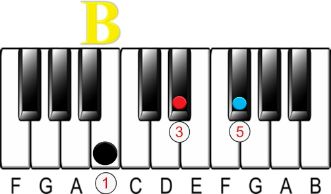
B Sus4
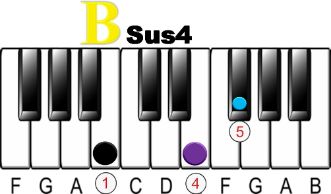
B Sus2
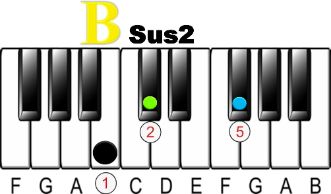
Suspended Chord Inversions
Sus4 Inversions
The notes of the sus4 chord can be played in root position, first inversion, or second inversion.
In Root position, the root of the Sus4 chord is the bottom.
C Sus4 root position
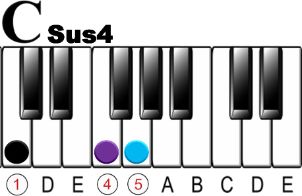
In first inversion, the root is on the top.
C Sus4 1st inversion
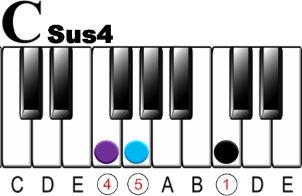
In second inversion, the root is in the middle.
C Sus4 2nd inversion
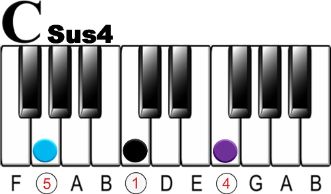
Sus2 Inversions
The notes of the sus2 chord can be played in root position, first inversion, or second inversion.
In Root position, the root of the Sus2 chord is the bottom.
C Sus2 root position
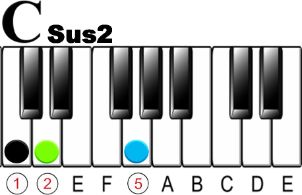
In first inversion, the root is on the top.
C Sus2 1st inversion
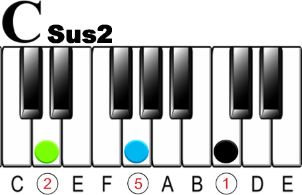
In second inversion, the root is in the middle.
C Sus2 2nd inversion
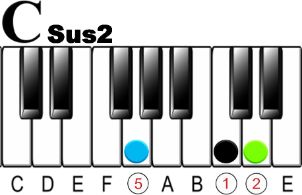
Sus4 Chords with Inversions
| Minor Chord | Root Position | 1st Inversion | 2nd Inversion |
| C Sus4 | C-F-G | F-G-C | G-C-F |
| F Sus4 | F-Bb-C | Bb-C-F | C-F-Bb |
| G Sus4 | G-C-D | C-D-G | D-G-C |
| D Sus4 | D-G-A | G-A-D | A-D-G |
| E Sus4 | E-A-B | A-B-E | B-E-A |
| A Sus4 | A-D-E | D-E-A | E-A-D |
| D flat Sus4 | Db-Gb-Ab | Gb-Ab-Db | Ab-Db-Gb |
| E flat Sus4 | Eb-Ab-Bb | Ab-Bb-Eb | Bb-Eb-Ab |
| A flat Sus4 | Ab-Db-Eb | Db-Eb-Ab | Eb-Ab-Db |
| *G flat Sus4 | Gb-Cb-Db | Cb-Db-Gb | Db-Gb-Cb |
| B flat Sus4 | Bb-Eb-F | Eb-F-Bb | F-Bb-Eb |
| B Sus4 | B-E-F# | E-F#-B | F#-B-E |
Sus2 Chords with Inversions
| Minor Chord | Root Position | 1st Inversion | 2nd Inversion |
| C Sus2 | C-D-G | D-G-C | G-C-D |
| F Sus2 | F-G-C | G-C-F | C-F-G |
| G Sus2 | G-A-D | A-D-G | D-G-A |
| D Sus2 | D-E-A | E-A-D | A-D-E |
| E Sus2 | E-F#-B | F#-B-E | B-E-F# |
| A Sus2 | A-B-E | B-E-A | E-A-B |
| D flat Sus2 | Db-Eb-Ab | Eb-Ab-Db | Ab-Db-Eb |
| E flat Sus2 | Eb-F-Bb | F-Bb-Eb | Bb-Eb-F |
| A flat Sus2 | Ab-Bb-Eb | Bb-Eb-Ab | Eb-Ab-Bb |
| *G flat Sus2 | Gb-Ab-Db | Ab-Db-Gb | Db-Gb-Ab |
| B flat Sus2 | Bb-C-F | C-F-Bb | F-Bb-C |
| B Sus2 | B-C#-F# | C#-F#-B | F#-B-C# |
How to develop proficiency in learning and playing Suspended Chords
- Learn all 12 Major chords in visual order
- Convert all Major chords into Sus4 and Sus2 chords in visual order
- Take each Suspended chord and play it in Root position, 1st inversion and 2nd inversion
- Apply suspended chords to your favorite music as well as your own songs
Final Thoughts
Suspended chords aren’t as prevalent in popular music as Major and minor chords. When they are present, they really accentuate the harmony because of the tension they provide. This tension in turn creates interest in any chord progression.
Until Next time, Go Play!
Greg Lee
Latest posts by Greg Lee (see all)
- What is a minor/Major 7 Chord? - October 26, 2023
- 7 Chord Substitutions that Professionals Use - October 19, 2023
- 5 Simple Chord Tricks to Sound Amazing - October 5, 2023




